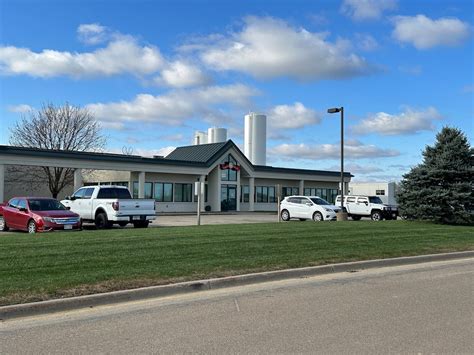
A sudden announcement of closure has left 300 workers at the PPG Architectural Coatings plant in Mount Vernon, Illinois, jobless and the local community grappling with the economic fallout. The closure, slated for the end of the year, was unexpectedly revealed to employees, leaving them “blindsided,” according to local reports.
The abrupt shutdown of the manufacturing facility, a significant employer in the region, has triggered widespread concern about the future livelihoods of affected families and the potential ripple effects on the broader Mount Vernon economy. “It was a shock to everybody,” Mount Vernon Mayor Matt Repovich stated, reflecting the sentiments of many in the community. The company cited a need to optimize its operations as the reason for the closure, a decision that has been met with dismay and disbelief by workers and local officials alike.
PPG, headquartered in Pittsburgh, Pennsylvania, stated that it will be ceasing operations at the Mount Vernon plant as part of a broader strategy to enhance its operational efficiency and better align its resources with market demands. The company indicated in its official statement that the decision was made after careful consideration and was necessary to ensure the long-term competitiveness of PPG’s architectural coatings business.
“Optimizing our operations is critical to ensuring we remain competitive and can continue to meet the evolving needs of our customers,” PPG said in a released statement. Despite the company’s rationale, the sudden nature of the announcement and the immediate impact on the workforce have drawn criticism from various quarters.
The United Steelworkers (USW) union, which represents the majority of the plant’s employees, expressed outrage at the decision, accusing PPG of prioritizing profits over people. The union vowed to fight for the rights and benefits of its members and to explore all possible avenues to mitigate the adverse effects of the closure.
“We are deeply disappointed by PPG’s decision to close the Mount Vernon plant,” said a USW representative. “This is a devastating blow to our members and the entire community. We will do everything in our power to support our members through this difficult transition and to hold PPG accountable.”
Local community leaders are now scrambling to assess the full impact of the plant closure and to develop strategies to support displaced workers and attract new investment to the area. The closure of the PPG plant represents a significant economic challenge for Mount Vernon, a city already facing its share of economic hardships.
The ripple effects of the closure are expected to extend beyond the immediate loss of jobs at the plant, impacting local businesses, service providers, and the overall tax base of the community. The Mount Vernon Economic Development Commission is working to identify potential opportunities for redevelopment and to attract new industries to the region.
The closure also raises questions about the future of manufacturing in Illinois and the challenges faced by communities dependent on industrial employment. Illinois has experienced a decline in manufacturing jobs in recent years, as companies have sought to reduce costs and improve efficiency by relocating production to other states or countries.
The PPG plant closure serves as a stark reminder of the importance of investing in workforce development and creating a business-friendly environment that can attract and retain manufacturing jobs. State and local officials are exploring various initiatives to support the manufacturing sector and to help communities like Mount Vernon adapt to the changing economic landscape.
Digging Deeper: The Impact and Repercussions
The PPG plant in Mount Vernon has been a fixture in the community for several decades, providing stable employment and contributing significantly to the local economy. The plant produces a range of architectural coatings, including paints, stains, and primers, which are sold to both professional contractors and consumers.
The closure of the plant will not only result in the loss of 300 jobs but also impact hundreds of other workers in related industries, such as suppliers, transportation companies, and service providers. The economic multiplier effect of the closure is expected to be significant, with the potential to reduce overall economic activity in the Mount Vernon area by millions of dollars.
In addition to the immediate economic impact, the closure will also have a profound social and psychological impact on the affected workers and their families. The loss of a job can lead to financial hardship, stress, and emotional distress. Many of the workers at the PPG plant have spent their entire careers at the facility and are now faced with the daunting prospect of finding new employment in a challenging job market.
The United Steelworkers union is working to provide support and assistance to its members, including job training, counseling, and financial advice. The union is also exploring legal options to challenge the plant closure and to ensure that PPG fulfills its obligations to the workers.
The closure of the PPG plant also raises broader questions about the role of corporate responsibility in an era of globalization and rapid technological change. Companies have a responsibility to consider the impact of their decisions on their workers and the communities in which they operate.
While companies need to remain competitive and adapt to changing market conditions, they also have an ethical obligation to treat their employees with fairness and respect. The PPG plant closure highlights the need for companies to engage in meaningful dialogue with their workers and communities and to explore all possible alternatives before making decisions that will have a devastating impact on people’s lives.
The economic and social challenges facing Mount Vernon are not unique. Many communities across the United States are struggling with the loss of manufacturing jobs and the decline of traditional industries. The need for proactive and comprehensive strategies to support workers and communities in transition is more urgent than ever.
Community Response and Future Prospects
The Mount Vernon community has rallied together in the wake of the PPG plant closure to support the affected workers and their families. Local businesses, community organizations, and government agencies are working to provide assistance and resources to help people find new employment and cope with the challenges they face.
A job fair is being planned to connect displaced workers with potential employers in the region. Workshops and training programs are being offered to help people upgrade their skills and prepare for new career opportunities. Financial counseling and support services are being provided to help families manage their finances and avoid foreclosure.
The Mount Vernon Economic Development Commission is actively working to attract new businesses and industries to the area. The commission is highlighting the city’s strategic location, skilled workforce, and business-friendly environment as assets for potential investors.
The commission is also exploring opportunities to redevelop the PPG plant site for other uses, such as a business park, a technology center, or a mixed-use development. The goal is to create new jobs and stimulate economic growth in the Mount Vernon area.
The closure of the PPG plant is a setback for Mount Vernon, but it is not the end of the road for the community. The city has a resilient spirit and a strong sense of community. With the support of its residents, businesses, and government agencies, Mount Vernon can overcome this challenge and build a brighter future.
The Illinois state government has also stepped in to offer assistance to the displaced workers and the Mount Vernon community. The state is providing resources for job training, career counseling, and financial aid. Governor J.B. Pritzker has expressed his commitment to supporting the affected families and helping the community recover from the economic blow.
“My administration is dedicated to assisting the workers and families impacted by the PPG plant closure,” Governor Pritzker stated. “We will work closely with local leaders and community organizations to provide the necessary resources and support to help them navigate this difficult transition.”
The state is also exploring potential incentives to attract new businesses to Mount Vernon and create new job opportunities. These incentives may include tax credits, grants, and infrastructure improvements. The goal is to diversify the local economy and reduce the community’s dependence on manufacturing jobs.
The PPG plant closure has also sparked a broader discussion about the need for policies that support manufacturing jobs and protect workers’ rights. Labor unions and advocacy groups are calling for stronger regulations to prevent companies from closing plants and moving jobs overseas without providing adequate notice and compensation to affected workers.
There is also growing support for policies that promote domestic manufacturing and encourage companies to invest in American workers and communities. These policies may include tax incentives for companies that create jobs in the United States, trade agreements that protect American industries, and investments in infrastructure and workforce development.
The Broader Economic Context
The PPG plant closure is part of a larger trend of manufacturing job losses in the United States. Over the past several decades, millions of manufacturing jobs have been lost as companies have moved production to countries with lower labor costs.
The decline in manufacturing employment has had a devastating impact on many communities across the country, particularly in the Midwest and the Northeast. These communities have lost jobs, income, and population, and have struggled to adapt to the changing economic landscape.
The PPG plant closure also reflects the challenges facing the architectural coatings industry. The industry has been affected by factors such as increased competition from foreign manufacturers, rising raw material costs, and changing consumer preferences.
To remain competitive, companies in the architectural coatings industry have been forced to consolidate their operations, reduce costs, and invest in new technologies. These efforts have often resulted in plant closures and job losses.
The PPG plant closure highlights the need for a comprehensive strategy to address the challenges facing the manufacturing sector and to support workers and communities in transition. This strategy must include investments in education and training, infrastructure improvements, and policies that promote domestic manufacturing and protect workers’ rights.
The closure also serves as a cautionary tale for other communities that rely heavily on manufacturing employment. These communities need to diversify their economies and invest in new industries to reduce their vulnerability to economic shocks.
The Mount Vernon community is determined to overcome the challenges posed by the PPG plant closure and to build a stronger and more resilient economy. The community’s spirit of collaboration and determination will be essential to its success.
Legal and Contractual Considerations
Beyond the immediate economic and emotional impact, the closure of the PPG plant raises significant legal and contractual considerations. The United Steelworkers union is carefully examining the terms of its collective bargaining agreement with PPG to ensure that the company is fulfilling its obligations to the workers.
The union is also investigating whether PPG violated any federal or state laws in its decision to close the plant. Under the Worker Adjustment and Retraining Notification (WARN) Act, companies with 100 or more employees are required to provide at least 60 days’ advance notice of a plant closure or mass layoff.
The WARN Act is designed to give workers and communities time to prepare for the economic consequences of a job loss. If PPG failed to provide adequate notice, it could be subject to legal penalties.
The union is also exploring whether PPG violated any provisions of the National Labor Relations Act, which protects workers’ rights to organize and bargain collectively. If PPG engaged in unfair labor practices, such as discriminating against union members or interfering with the union’s ability to represent its members, it could be subject to legal action.
In addition to legal challenges, the union is also negotiating with PPG to secure a fair severance package for the affected workers. The severance package may include payments for unused vacation time, health insurance benefits, and job placement assistance.
The union is also seeking to ensure that the workers receive all of the pension benefits that they are entitled to under PPG’s retirement plan. The union is working with pension experts to review the terms of the plan and to ensure that the workers’ benefits are protected.
The legal and contractual issues surrounding the PPG plant closure are complex and multifaceted. The United Steelworkers union is committed to protecting the rights and interests of its members and to ensuring that PPG fulfills its obligations to the workers.
The Human Cost
Beyond the statistics and economic analyses, the PPG plant closure represents a profound human cost. The 300 workers who are losing their jobs are not just numbers on a spreadsheet. They are individuals with families, dreams, and aspirations.
Many of these workers have spent their entire careers at the PPG plant and have dedicated their lives to their jobs. They have taken pride in their work and have contributed to the success of the company.
Now, they are facing the uncertainty and anxiety of unemployment. They are worried about how they will pay their bills, support their families, and find new employment.
The PPG plant closure is a reminder that economic decisions have real-world consequences. These decisions can affect people’s lives in profound ways.
It is essential that companies consider the human cost of their decisions and that they take steps to mitigate the negative impact on workers and communities.
The Mount Vernon community is rallying together to support the affected workers and their families. Local residents are offering assistance with job searches, childcare, and other needs.
Community organizations are providing counseling and support services to help people cope with the stress and emotional distress of job loss.
The PPG plant closure is a difficult time for Mount Vernon, but it is also a time of resilience and compassion. The community’s spirit of unity will help it to overcome this challenge and to build a brighter future.
Frequently Asked Questions (FAQ)
-
Why did PPG close the Mount Vernon plant?
PPG cited the need to “optimize its operations” as the primary reason for closing the Mount Vernon plant. The company stated that the decision was made to enhance operational efficiency and better align resources with market demands. This is part of a broader strategy to ensure the long-term competitiveness of PPG’s architectural coatings business.
-
How many workers are affected by the plant closure?
The closure of the PPG Architectural Coatings plant in Mount Vernon, Illinois, has directly impacted approximately 300 workers. These employees will lose their jobs when the plant ceases operations at the end of the year.
-
What is the United Steelworkers union doing to support its members?
The United Steelworkers (USW) union, which represents the majority of the plant’s employees, has expressed deep disappointment and outrage at PPG’s decision. The union is committed to fighting for the rights and benefits of its members, exploring legal options, negotiating a fair severance package, and providing support services such as job training, counseling, and financial advice. They aim to hold PPG accountable and mitigate the adverse effects of the closure.
-
What is the local community doing to help the displaced workers?
The Mount Vernon community, including local businesses, community organizations, and government agencies, is actively working to support the displaced workers. Efforts include planning a job fair, offering workshops and training programs to upgrade skills, providing financial counseling, and actively working to attract new businesses and industries to the area through the Economic Development Commission. The community is also exploring opportunities to redevelop the PPG plant site.
-
What assistance is the state of Illinois providing?
The Illinois state government is providing resources for job training, career counseling, and financial aid to the displaced workers. Governor J.B. Pritzker has stated his administration’s dedication to assisting the impacted workers and families. The state is also exploring potential incentives, such as tax credits and grants, to attract new businesses to Mount Vernon and diversify the local economy.
The information presented here is based on the provided Yahoo News article.









